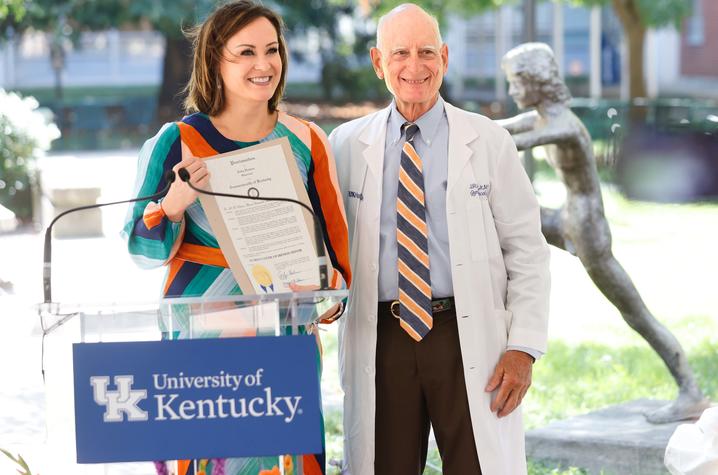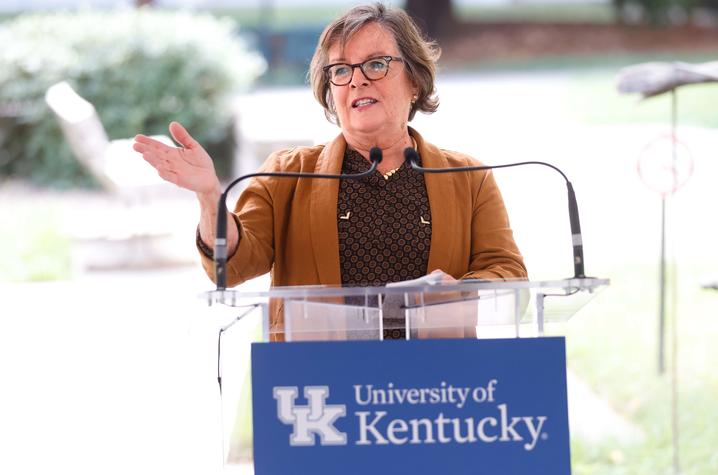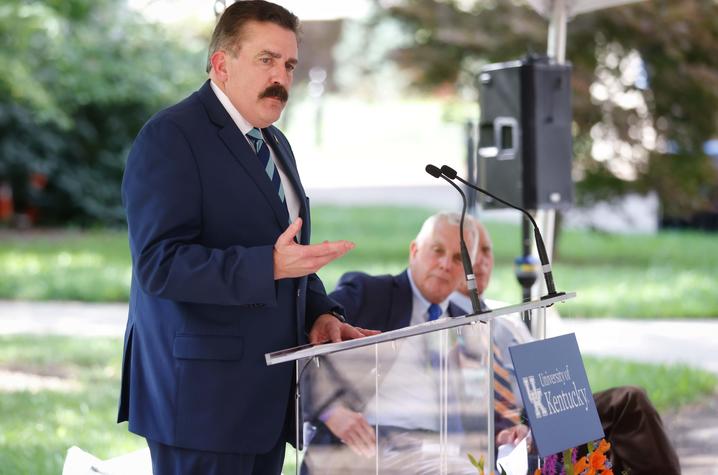Lt. Gov. Coleman, Female Legislators Highlight UK’s Ovarian Cancer Screening Program
LEXINGTON, Ky. (Sept. 2, 2021) — As part of National Ovarian Cancer Awareness Month, Kentucky Lt. Gov. Jacqueline Coleman and several of Kentucky’s female legislators joined UK HealthCare to highlight the long-running work of the University of Kentucky Markey Cancer Center's Ovarian Cancer Screening Program.
The program is an ongoing, 34-year research study showing that annual screening continues to detect ovarian cancer at an earlier stage than is possible with a clinical examination. Kentucky legislators Joni Jenkins and Cherylynn Stephenson visited UK HealthCare to offer their support for the program. Kentucky Gov. Andy Beshear also sent along his support for the program.
“Few things are more upsetting and stressful than receiving a cancer diagnosis for yourself or a loved one. It can upend your whole world,” Gov. Beshear said. “But as our doctors and other health care heroes who treat and care for cancer patients every day will tell you: The problem often isn’t getting a cancer diagnosis, it’s not getting it early enough. The Ovarian Cancer Screening Program at the University of Kentucky provides thousands of Kentucky women with free, easy screenings every year, giving them peace of mind about their health or the best fighting chance at recovery through early detection. I am pleased to support this effort and others as we work to bring high-quality, equitable care to all of our citizens.”
Joining Coleman in person to talk about the program were Markey gynecologic oncologist John R. van Nagell Jr.. M.D.; Nancy Cox, vice president for land-grant engagement and dean of the UK College of Agriculture, Food and Environment; and Mark F. Newman, M.D., UK executive vice president for health affairs.
Markey's Ovarian Screening Program was initiated in 1987 by van Nagell and his colleagues. The goal was to determine whether transvaginal sonography (TVS) could be an effective means of early ovarian cancer detection.
For more than 50 years, ovarian cancer has remained the leading cause of gynecologic cancer mortality in the United States. This year, the American Cancer Society estimates that approximately 13,770 deaths from ovarian cancer will be reported in the United States, making it the fifth leading cause of cancer mortality in women.
When it is detected early, women often can be cured with existing treatment methods. However, most women have no symptoms until the disease has progressed to an advanced stage. As the disease progresses, survival rates drop sharply. In 2018, van Nagell published a study in Obstetrics and Gynecology that shows that annual ultrasound screening of at-risk asymptomatic women increases the survival rates of women with type I and type II epithelial ovarian cancer.
“While regular pelvic examinations are important and can detect many other abnormalities, including cervical cancer, they are not effective in detecting ovarian cancer in its earliest and most treatable stages,” van Nagell said. “Early detection is vital to saving lives. In fact, the five-year survival rate of women whose cancer was detected by screening is 86% — that’s twice as high as those who do not get screened.”
Transvaginal sonography (TVS) is painless, radiation-free and can be completed in less than 15 minutes. During the examination, a small vaginal probe is used to take a sonographic picture of the ovaries, and to measure ovarian volume. This procedure is able to detect ovarian tumors even when they are too small to be diagnosed during an annual gynecological examination.
So far, nearly 345,230 free screening examinations have been provided to more than 49,358 Kentucky women, and women from every county in the state have participated in this program. Through the screenings, 632 ovarian tumors and 110 ovarian malignancies have been detected, as well as 23 non-ovarian malignancies. Currently, screenings are being performed at four locations throughout the state, including Lexington, Elizabethtown, Somerset and Paducah.
At present, more than 5,800 women have already scheduled to be screened for the Sept. 1, 2021 to Jan 1, 2023 period.
“Right now, it’s more important than ever for people to remain vigilant about their health, including keeping up their regular schedule of health screenings,” said Mark F. Newman, M.D., UK executive vice president for health affairs. “We know that many cancer screenings have been postponed or skipped over the past 16 months due to the pandemic, but it’s vital to stay on top of your screenings to prevent future health problems later on. Ovarian cancer screening is not widely available across the country, so I encourage Kentucky women to take advantage of this unique opportunity to take control of their own health by joining the UK Ovarian Screening Program when they’re eligible.”
The initial funding for the program came from the Telford Foundation and the Kentucky Extension Homemakers Association (KEHA). The late Virginia McCandless, a Barren County extension homemaker, started the ovarian cancer research fundraising effort with van Nagell in 1977. Their goal was to raise $1 from each member of KEHA. Her idea took off, and KEHA members have supported it by participating in regular screenings and challenging each county to donate at least $1 per member annually.
“We are extremely proud of the Kentucky Extension Homemakers Association’s dedication to this lifesaving program,” said Cox. “Their fundraising efforts have raised more than $1.5 million but their work really goes beyond fundraising. They routinely participate in the screening program, organize trips to screening sites from around the state, promote ovarian cancer awareness, and host educational events regarding ovarian cancer. This program positively impacts Kentucky women and represents the kind of research that should be conducted by a state's land-grant university.”
The Ovarian Cancer Screening Program is open to women age 50 or older, or women over the age of 25 who have a family history of ovarian cancer. Screening is free. For more information, call 859-323-4687 or 800-766-8279.



As the state’s flagship, land-grant institution, the University of Kentucky exists to advance the Commonwealth. We do that by preparing the next generation of leaders — placing students at the heart of everything we do — and transforming the lives of Kentuckians through education, research and creative work, service and health care. We pride ourselves on being a catalyst for breakthroughs and a force for healing, a place where ingenuity unfolds. It's all made possible by our people — visionaries, disruptors and pioneers — who make up 200 academic programs, a $476.5 million research and development enterprise and a world-class medical center, all on one campus.




